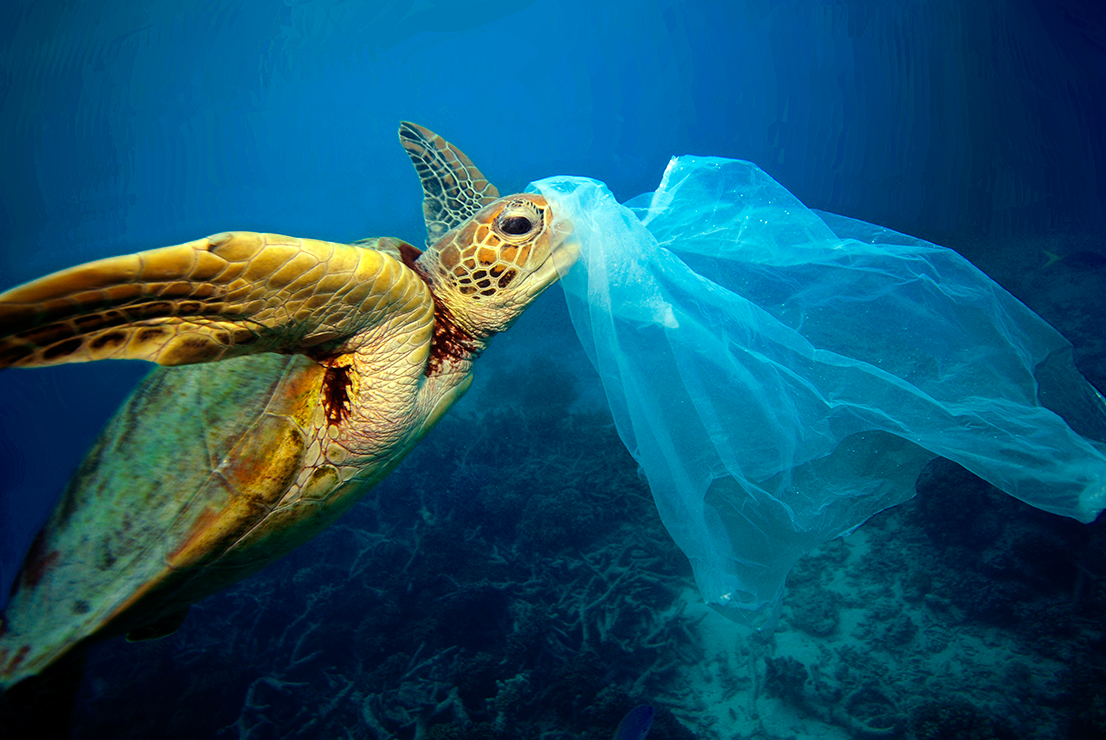The other weekend I asked my partner to run out and grab some groceries I needed for dinner. I noticed him leaving, sans re-usable bag so yelled, "don't forget this!" and chucked a cotton bag his way. He grabbed the bag and said "it's okay if I forget a bag anyway, they (our local grocery shop) use biodegradable bags!" as he headed out the door. It seems to be a common misconception that degradable or biodegradable bags are a suitable alternative to plastic bags, but they're great in theory and environmentally destructive in reality. Recently, a senate enquiry into the threat of marine plastic pollution in Australia found that the degradable bag option is equally as bad for the environment as regular plastic bags. The report based on the senate findings stated that;
"WHILE CONSUMERS MIGHT FEEL THEY ARE 'DOING THE RIGHT THING' BY CHOOSING BIODEGRADABLE OR DEGRADABLE PLASTIC, THESE PRODUCTS SIMPLY DISINTEGRATE INTO SMALLER AND SMALLER PIECES TO BECOME MICROPLASTIC."
The inquiry also found that there is some serious confusion amongst the community surrounding the difference between bag types. It can be difficult to navigate the minefield of planet-friendly options, so here's our handy guide to help you separate what's truly eco from what to veto.
Traditional plastic bags
How are traditional plastic bags detrimental to our environment? Let me count the ways. Single-use plastic bags have an average life span of 12 minutes, and worldwide we are using 2 million of these every sixty seconds. Polyethene bags are made from a non-renewable resource, and are incredibly harmful to the marine environment as they never biodegrade. Instead, they will simply break into smaller and smaller pieces over hundreds of years, inflicting untold amounts of damage to natural ecosystems.Biodegradable plastic bags
To put it simply, something is biodegradable when living things, like fungi or bacteria, can break it down. Biodegradable bags are made from plant-based materials like corn and wheat starch rather than petroleum. However when it comes to this kind of plastic, there are certain conditions required for the bag to begin to biodegrade. Firstly, temperatures need to reach 50 degrees Celsius. Secondly, the bag needs to be exposed to UV light. In an oceanic environment, you'd be hard pressed to meet either of these criteria. Plus, if biodegradable bags are sent to landfill, they break down without oxygen to produce methane, a greenhouse gas with a warming capacity 21 times more powerful than carbon dioxide.Degradable or 'oxo-degradable' plastic bags
Degradable items don't have living organisms as a crucial part of the breakdown process. Degradable bags cannot be classed as biodegradable or compostable. Instead, chemical additives used in the plastic allow the bag to break down quicker than a standard plastic bag usually would. Essentially bags touted as 'degradable' are definitely not beneficial, and can even be worse for the environment! Degradable bags that disintegrate just become tinier and tinier pieces of microplastic quicker, and still pose serious threats to marine life. Microplastics enter the food chain lower down, getting eaten by smaller species and then continuing to make their way up the food chain as these smaller species are consumed. Professor Tony Underwood from the University of Sydney described degradable plastic bags as "not a solution to anything much, unless we are quite happy to shift it all into particle-sized plastics rather than plastic bag-sized plastic.""NOT A SOLUTION TO ANYTHING MUCH, UNLESS WE ARE QUITE HAPPY TO SHIFT IT ALL INTO PARTICLE-SIZED PLASTICS RATHER THAN PLASTIC BAG-SIZED PLASTIC."- PROFESSOR TONY UNDERWOOD ON DEGRADABLE BAGS
Compostable plastic bags
The word 'compostable' is incredibly misleading for the average consumer. You'd think a bag labeled 'compostable' would mean you could throw it in your backyard compost alongside your fruit and vegie scraps, right? Wrong. Compostable bags biodegrade, but only under certain conditions. Compostable bags need to be composted in a specific composting facility, of which there are very few of in Australia. Compostable bags are generally made from plant material that return to base organic components when processed by these facilities, but the problem lies in the fact there are thus far only 150 of these facilities Australia wide.
Can I recycle plastic bags?
Plastic bags, biodegradable, degradable and compostable bags cannot be placed in your standard recycling bin at home. They can severely interfere with the recycling process if they are. However, your local supermarket may offer plastic bag recycling. Some supermarkets can also recycle 'green bags' that are torn or no longer used.
Which is the best bag to use?
BYO bag is the best option. The labeling on plastic bags can be confusing and misleading, so bringing your own bag along will avoid disposing of a plastic bag incorrectly. Invest in a sturdy canvas bag, or a small cotton bag that you can throw in your handbag and use when you get some last minute groceries. We need to transition from relying on items of convenience, and instead focus on small actions that show care for the world we live in. Ditching single-use plastic bags of all kinds is the first step.





Leave a comment